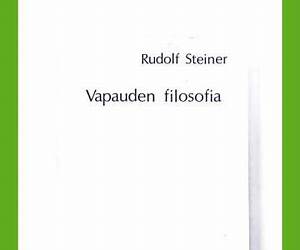Vapauden filosofia By Rudolf Steiner
Book Vapauden filosofia

Rudolf Steinerin filosofisen kauden paateos ilmestyy uutena tarkistettuna painoksena Kirjan kolme aikaisempaa painosta ovat olleet jo vuosia loppuunmyydyt Teoksen ydinkysymys on siita onko ihmisen mahdollista olla ajattelussaan ja toiminnassaan vapaa ja missa olosuhteissa tahdonvapaus on mahdollista Steinerin vapauden filosofia paneutuu erityisesti tiedon ongelmaan ja haastaa vallalla olleen ja nykyaankin ajankohtaisen Kantin transsendentaalisen idealismin ja siita seuranneen velvollisuusetiikkan Teos toimii myos filosofisena pohjana Steinerin ajattelusta seuranneille sovelluksille kuten waldorf steinerpedagogiikalle Vapauden filosofiaRudolf Joseph Lorenz Steiner was an Austrian occultist social reformer architect esotericist and claimed clairvoyant Steiner gained initial recognition at the end of the nineteenth century as a literary critic and published works including The Philosophy of Freedom At the beginning of the twentieth century he founded an esoteric spiritual movement anthroposophy with roots in German idealist philosophy and theosophy His teachings are influenced by Christian Gnosticism or neognosticism Many of his ideas are pseudoscientific He was also prone to pseudohistory.
EBook Vapauden filosofia organizacional In the first philosophically oriented phase of this movement Steiner attempted to find a synthesis between science and spirituality His philosophical work of these year Rudolf Joseph Lorenz Steiner was an Austrian occultist social reformer architect esotericist and claimed clairvoyant Steiner gained initial recognition at the end of the nineteenth century as a literary critic and published works including The Philosophy of Freedom At the beginning of the twentieth century he founded an esoteric spiritual movement anthroposophy with roots in German idealist philosophy and theosophy His teachings are influenced by Christian Gnosticism or neognosticism Many of his ideas are pseudoscientific He was also prone to pseudohistory.
Spirituality Vapauden filosofia de In the first philosophically oriented phase of this movement Steiner attempted to find a synthesis between science and spirituality His philosophical work of these years which he termed spiritual science sought to apply what he saw as the clarity of thinking characteristic of Western philosophy to spiritual questions differentiating this approach from what he considered to be vaguer approaches to mysticism In a second phase beginning around 1907 he began working collaboratively in a variety of artistic media including drama dance and architecture culminating in the building of the Goetheanum a cultural centre to house all the arts In the third phase of his work beginning after World War I Steiner worked on various ostensibly applied projects including Waldorf education biodynamic agriculture and anthroposophical medicine.
Philosophy Vapauden filosofia griega Steiner advocated a form of ethical individualism to which he later brought a explicitly spiritual approach He based his epistemology on site_link Johann Wolfgang von Goethe s world view in which thinking is no and no less an organ of perception than the eye or ear Just as the eye perceives colours and the ear sounds so thinking perceives ideas A consistent thread that runs through his work is the goal of demonstrating that there are no limits to human knowledge site_link.
